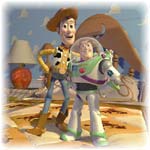En esta parte, analizamos extractos de guiones de películas para entender el uso del inglés cotidiano auténtico. Lee los fragmentos e intenta comprenderlos. Luego, lee la explicación del vocabulario. Finalmente, vuelve a leer el texto.
Recomendaciones para aprender inglés con películas
1. Elige escenas cortas, retrocede y vuelve a mirarlas para tratar de entenderlas.
2. Desactiva los subtítulos en español. Si aún no logras entender el diálogo, activa la opción "CC" (Closed Caption) de tu televisor para ver los subtítulos en inglés.
3. Es aconsejable comenzar con películas infantiles o animadas como ésta, ya que la trama es más sencilla y generalmente el vocabulario y las expresiones usadas son más fáciles de seguir.
4. Presiona el botón "Pausa" y repite las frases que escuchas. Si no entiendes alguna palabra, utiliza un diccionario.
5. Presta atención a la pronunciación y la entonación. De esta forma, irás entrenando el oído para identificar las palabras, lo cual ciertamente te ayudará a mejorar tu comprensión del inglés.
 REX: What? Whaddaya mean, the party's today? His birthday's not till
next week!
REX: What? Whaddaya mean, the party's today? His birthday's not till
next week!HAMM: What's going on down there? Is Mom losing her marbles?
WOODY: Well, obviously she wanted to have the party before the move. I'm not worried. You shouldn't be worried.
MR. POTATO HEAD: Of course Woody ain't worried! He's been Andy's favorite since kindergarten!
SLINKY: Hey, hey, come on, Potato Head! If Woody says it's all right, then, well, darn it, it's good enough for me. Woody has never steered us wrong before.
WOODY: Come on, guys! Every Christmas and birthday we go through this.
REX: But what if Andy gets another dinosaur? A mean one? I just don't think I can take that kind of rejection.
WOODY: Hey, listen, no one's getting replaced. This is Andy we're talking about. It doesn't matter how much we're played with. What matters is that we're here for Andy when he needs us. That's what we're made for, right?
| whaddaya | Forma coloquial de what do you. En este caso, What do you mean? significa "¿Qué quieres decir?" |
| till | hasta. Equivale a until. |
| what's going on? | ¿qué sucede? ¿qué está pasando? |
| down there | allí abajo |
| to lose one's marbles | volverse loco. Equivale a to go mad. |
| move | mudanza. El verbo to move significa moverse, pero también mudarse. |
| to be worried about something | estar preocupado por algo. Notar el uso de la preposición about. |
| ain't | Contracción coloquial que equivale a isn't, aren't, hasn't o haven't |
| kindergarten | jardín de infancia/niños |
| darn it | Expresión coloquial del inglés americano usada para mostrar enojo o decepción. Equivale al español ¡jolín!, ¡venga!, ¡ya! |
| to steer somebody wrong | guiar mal a alguien |
| to go through something | pasar por algo |
| mean | malo, desagradable |
| rejection | rechazo. El verbo to reject significa rechazar. |
| it doesn't matter | no importa |
| how much we're played with | cuánto se juega con nosotros. Se trata de una oración en voz pasiva. Notar la posición de la preposición with al final. |
| what we're made for | para lo que somos fabricados. Se trata de otra ejemplo de voz pasiva. Notar la posición de la preposición for al final. |
BUZZ: I just want you to know that even though you tried to terminate me, revenge is not an idea we promote on my planet.
WOODY: Oh, oh, that's good!
BUZZ: But we're not on my planet, are we?
WOODY: No.
| to be alive | estar vivo |
| to be saved | estar salvado |
| a big mistake | un gran error |
| buddy | Forma coloquial del inglés americano que equivale al español "amigo". En inglés británico se usa mate. |
| even though | aunque |
| revenge | venganza. To take revenge on somebody for something significa vengarse de alguien por algo. |
| on my planet | en mi planeta. Notar el uso de la preposición on. |

BUZZ: I can't help. I can't help anyone.
WOODY: Why, sure you can, Buzz. You can get me out of here and then I'll get that rocket off you, and we'll make a break for Andy's house.
BUZZ: Andy's house. Sid's house. What's the difference?
WOODY: Oh, Buzz, you've had a big fall. You must not be thinking clearly.
BUZZ: No, Woody, for the first time I am thinking clearly. You were right all along. I'm not a Space Ranger. I'm just a toy. A stupid little insignificant toy.
WOODY: Whoa, hey, wait a minute. Being a toy is a lot better than being a Space Ranger.
BUZZ: Yeah, right.
WOODY: No, it is! Look, over in that house is a kid who thinks you are the greatest, and it's not because you're a Space Ranger, pal, it's because you're a toy! You are his toy!
| over here | hacia aquí |
| tool box | caja de herramientas. Para aprender los nombres de herramientas, ver Tools. |
| off me | de encima mío |
| to help somebody | ayudar a alguien. Notar que en inglés no se usa preposición. |
| to make a break for something | empezar a correr hacia algo |
| big fall | gran caída |
| all along | todo el tiempo |
| whoa | Exclamación que se usa para decirle a alguien que se calme, para que haga algo más despacio o para mostrar que se está sorprendido por lo dicho por la otra persona. |
| better | mejor. Es la forma comparativa de good (bueno). Para aprender más, ver Comparatives and Superlatives. |
| yeah | Forma coloquial de yes (sí) |
| the greatest | el más grande. Forma superlativa de great (grande). Para aprender más, ver Comparatives and Superlatives. |
| pal | Forma coloquial que equivale al español "amigo". Se usa tanto en inglés británico como americano. |
- ALADDIN
- GLADIATOR
- NOTTING HILL
- SHREK
- TITANIC
- TOY STORY
Ver todas las películas
The scripts and the images are copyright.
They are used here for educational purposes only.
Otras páginas que pueden interesarte
Por temas, con imágenes y ejemplos de uso.
Listas de Vocabulario
Descubre el origen de las palabras en
The Story behind the Words
 ¿Quieres conocer la vida de Agatha Christie, The Beatles o la Reina de Inglaterra? Practica inglés con la lectura de artículos de cultura inglesa.
¿Quieres conocer la vida de Agatha Christie, The Beatles o la Reina de Inglaterra? Practica inglés con la lectura de artículos de cultura inglesa.Reading
 Practica comprensión auditiva (listening comprehension) con noticias de la actualidad.
Listening
Practica comprensión auditiva (listening comprehension) con noticias de la actualidad.
Listening



